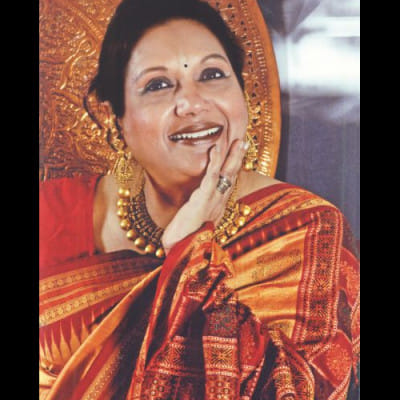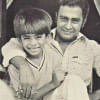Muniments of my life

Kabori Sarwar is the heart-throb of the 60's and 70's Bangladeshi silver screen. She received the National Award for best actress in 1978. In a recent interview, she has unveiled her memoir for the readers of 'Star Showbiz'.
The humble beginning
People of Chattagram have a spontaneous affinity with culture. My father Krishna Das Paul was a Bhajan singer and my mother used to recite verses from religious books. All of my siblings were associated with art and culture; some were singers, some used to dance and some could play the tabla. I learned folk music from my guru Runu Biswas. Back then, Sajeda Chowdhury was the secretary of All Pakistan Women's Association and I performed as a child artist in one of their functions. My father was a friend of Dr Kamal and he knew Satya Saha, the legendary music director. Satya Saha was looking about for someone to play the heroine in Subhash Dutta's Sutorang. The female lead was supposed to romance Subhash Dutta in it. They were looking for an innocent, youthful face that would be relevant in the rural and rustic mise-en-scene of the cinema. At that time, directors used to choose heroines conforming to the demands of character. Thus, at the age of 13 I was selected for Sutorang. Subhash Dutta taught me all the subtle arts of acting and performing in cinema. That is how I turned my hand to the cinema industry. My family and locals had never taken negatively my decision to work in films. They were rather very enthusiastic as someone from their locality was venturing into the entertainment world and adding glory to their cultural history.
The Unique Journey
I did an Urdu film of Zahir Raihan, Bahana in 1965. It was another incredible journey of my career. Delivering dialogues in Urdu was rather engrossing and amusing. I met Rittwik Ghatak through another Indian film director Bimal Roy while the liberation war was going on. He expressed his desire of doing a film with me and thus I was roped in to act in that iconic film of Rittwik Ghatak, Titas Ekti Nadir Naam. After that back to back successes, I never had to look back and my career kept finding its own way. My pair with Razzak, Sohel Rana and many other actors was applauded by our audience. Faruq, Sohel Rana, Ujjal, Zafar Iqbal and a lot of other bright actors of our generation had debuted in the industry as my co-artist. Saat Bhai Champa with Azim bhai became a golden jubilee. Qazi Zaheer's, Moynamoti was another super hit. Razzak, Alamgir, Mustafa bhai, Zafar Iqbal, Ujjal, Anowar Hossain, Raushan Jamil all of them were my dear associates. Sujan Sokhi received critical acclaim, particularly for my performance which brought me Bachsas Award for Best Actress. Later on, I was given the Bangladesh National Film Award for my performance in Sareng Bou in 1978. Till today I have been honored with multiple awards including the lifetime achievement awards several times.
The heroine off screen
I had fled from the city on April 19, 1971. The situation throughout the country then was very tensed. The secret agents of Pakistani army had cast dismay over the entire country. Mass murders were on the rise. I gave away a car of mine for our freedom fighters to the brother of Akhteruzzaman who was killed by the Pakistani spies some days later. In the village, we used to wake up every morning with an obscure hope of getting the news that Bangladesh was officially free from all the tyranny of the Pakistanis. Every morning we chorused Amar Shonar Bangla in a gentle croon and cried our hearts out. While going towards the Agartala border, we had to walk three days and three nights at a stretch. We had to halt in the middle of the way and lurk in the darkness of a cornfield sensing the presence of Pakistani army from distance. After crossing the border, Anil Bhattacharya, the Agartala correspondent of Jugantor Patrika sheltered us at his home and I learned how to inflame public feelings through prelecting from him. Then I went to Kolkata and met Khaled Mosharraf during my stay at Dipankar Dey's house. My journey as a freedom fighter began since then. I moved from here to there, from Delhi to Bombay. I met Lataji, Wahida Rahaman, Nargis and sang with them. I conveyed the truth, reality and sufferings that my country's people were enduring through my words. Dr. Anand and Asha Anand had helped me with a roof over my head. Ashok Sharma, Shakti Samanta, Salil Chowdhury, Bombay Governor Ali Razzak, they all deserve our gratitude for their selfless assistance and support in the time of the Liberation War. I had donated blood for our freedom fighters. Debdulal Banerjee had broadcast an interview of mine where I had solicited the public's sympathy and support for the jeopardized, unarmed people of my country in all humility. My assignment was to motivate the emotions of common people. I talked to a secretary of Indira Gandhi in relevance to my assignment; he told me that Mrs. Gandhi was as worried about the ongoing atrocities on our people by the Pakistanis as we were.
The lost spring romance duo
There was a time the Kabori-Razzak duo had become the prerequisite for a successful film in the box office. We two were cinematically committed to each other. Our pair had created an aura of romance in people's heart. At times, Razzak improvised a dialogue and I responded in a way as if I knew what he was going to convey, and it was all on-the-spot and instantaneous. Our understanding was beyond perfection. Gradually, a conspiratorial politics entered the industry which repeatedly tried to break that classic duo. I was being replaced by Shabana, Babita and others knowingly and decidedly. My active participation in the Liberation War had made me a common foe of the entire industry. Even Subhash Dutta and Ata bhai had deprived me of some films that I was supposed to work in. I felt like an outcast and a forsaken part of the entire industry. It took me a lot of courage to decide that I would gradually seclude myself from all the traces of ostentation. My last remarkable film was Devdas. I got involved in social work and began to work for children and women. I never held back to from raising my voice against the distortion of the history of our glorious Liberation War.
Politics and Vision
In 2008, I got nomination from the Awami League and was elected to the National Parliament in Bangladesh serving as an MP. A door of a new world was opened for me then. The political situation of Narayanganj was horrifying. I took it as a challenge and kept fighting against the existing grisly politics. Battling against injustice and impropriety is in my blood. I marched at the Shaheed Minar in support of a secular constitution during Ershad's government. Bangabandhu had created a cultural platform. I want to fulfill his dream project. A separate ministry for art and cinema can contribute enormously to the development of our industry. That is my primary political vision. The Awami League government has already put a lot of efforts to augmenting the environment of the cinema industry. Previously, this industry went through the worst phase and the epoch of obscene movies had cast its pall over our sky. I am hopeful about our Prime Minister's honest wishes for the betterment of our country.
An Honest outlook
The present situation of our cinema industry is upsetting. They do not know what they are doing, why they are doing, nor do they do sufficient research on their subject. If you do not read a good book and invest time in watching classic movies, you cannot cultivate your artwork. I made a film called Ayna in 2006. The story was about an acid victim. I had worked on it for over a year. If Indian films get an open-air market in Bangladesh, our film industry might face an irreparable avalanche. I watched Aynabaji and Swapnajaal recently. Some scenes of Aynabaji are praiseworthy. As for Swapnajaal, I found the storyline very fictional and it became a farrago.
The gambles of life
Satyajit Ray intended to make Pratidwandi with me. Subsequently, some other actor worked in it. My film Ayna won many awards at Meril Prothom Alo Awards. But Ayna got no national award. I have made another film called Ekattorer Michil which is yet to get released and probably would remain unnoticed forever. Recently, I submitted another film for government grant but my appeal got discarded because of internal politics. This film has an intriguing storyline with a genuine essence in its dialogues.
Facing it out
The battle of my life is imperishable. I have learned to love and live with it. The big awards and celebrity fame do not put me on any significant pedestal, my greater attainment is the love and respect of my admirers and followers that I have earned over the years. I wrote an autobiography that got released in last year's book fair where I conveyed my emotions and stories from my past in words. Life is fleeting and brutal. All I want is to leave an everlasting spot in the plain canvas of life.

 For all latest news, follow The Daily Star's Google News channel.
For all latest news, follow The Daily Star's Google News channel. 







Comments